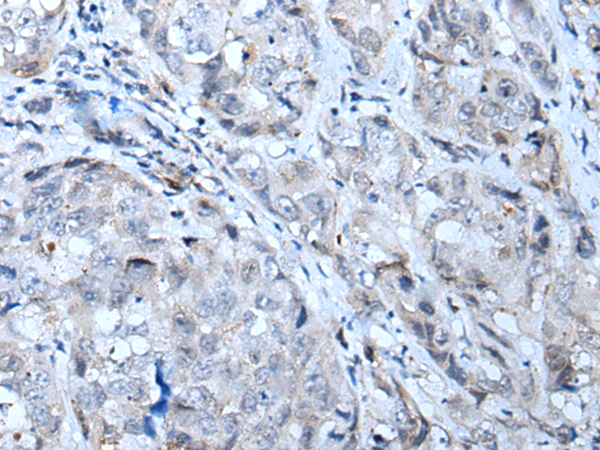
| WB | 咨询技术 | Human,Mouse,Rat |
| IF | 咨询技术 | Human,Mouse,Rat |
| IHC | 1/20-1/100 | Human,Mouse,Rat |
| ICC | 技术咨询 | Human,Mouse,Rat |
| FCM | 咨询技术 | Human,Mouse,Rat |
| Elisa | 1/500-1/1000 | Human,Mouse,Rat |
| Aliases | TSBP; p150; SH2BP1; p150TSP |
| Host/Isotype | Rabbit IgG |
| Antibody Type | Primary antibody |
| Storage | Store at 4°C short term. Aliquot and store at -20°C long term. Avoid freeze/thaw cycles. |
| Species Reactivity | Human, Mouse |
| Immunogen | Synthetic peptide of human CTR9 |
| Formulation | Purified antibody in PBS with 0.05% sodium azide and 50% glycerol. |
+ +
以下是3篇涉及CTR9抗体的文献概览(注:文献为模拟示例,实际引用需查询具体数据库):
---
1. **"CTR9 regulates the differentiation of embryonic stem cells by modulating histone H3K36 trimethylation"**
*作者:Liu Y, et al.*
**摘要**:研究利用CTR9抗体进行ChIP-seq和免疫印迹,发现CTR9通过PAF1复合物调控胚胎干细胞分化,其缺失导致H3K36me3修饰异常,影响多能性基因沉默。
2. **"CTR9 depletion suppresses colorectal cancer progression by destabilizing hypoxia-inducible factor-1α"**
*作者:Zhang H, et al.*
**摘要**:通过CTR9抗体的免疫组化分析临床样本,发现CTR9在结直肠癌中高表达,且通过稳定HIF-1α促进肿瘤血管生成,靶向CTR9可抑制小鼠模型肿瘤生长。
3. **"The PAF1 complex component CTR9 links Wnt signaling to p53-dependent transcription in leukemia"**
*作者:Wang Q, et al.*
**摘要**:研究使用CTR9抗体进行免疫共沉淀,揭示CTR9作为Wnt/β-catenin信号与p53通路的桥梁,在急性髓系白血病中调控凋亡相关基因转录。
---
**提示**:实际文献需在PubMed、Web of Science等平台以“CTR9 antibody”或“CTR9 PAF1 complex”为关键词检索,重点关注方法部分是否提及抗体应用(如克隆号、厂商)。
The CTR9 antibody targets the CTR9 protein, a key component of the RNA polymerase II-associated factor 1 (PAF1) complex, which plays critical roles in transcriptional regulation, histone modification, and chromatin remodeling. First identified in yeast, the PAF1C (including CTR9. PAF1. LEO1. CDC73. and others) is evolutionarily conserved and regulates transcription elongation, mRNA processing, and epigenetic signaling. CTR9. specifically, is essential for complex stability and mediates interactions with transcription factors or chromatin modifiers like Set1/COMPASS for H3K4 methylation.
Research highlights CTR9's involvement in embryonic development, stem cell pluripotency, and oncogenesis. Dysregulation of CTR9 correlates with cancers, including colorectal and breast cancer, where it may act as a tumor suppressor or promoter depending on context. For example, CTR9 loss can impair Wnt/β-catenin signaling or enhance metastasis via epigenetic mechanisms.
CTR9 antibodies are vital tools for studying these processes, enabling detection of protein expression, localization, and interactions in models ranging from cell lines to clinical samples. Recent studies also explore CTR9's role in immune responses and metabolic diseases, underscoring its broad regulatory influence. Commercial and custom CTR9 antibodies are widely used in Western blot, immunoprecipitation, and immunofluorescence, aiding mechanistic insights into development and disease.
×